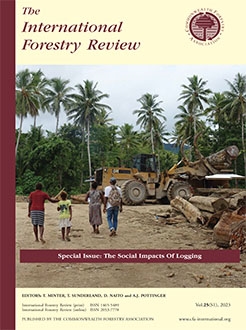The social impacts of logging in tropical forests are overwhelmingly negative and affect local and Indigenous people's livelihoods, their relationships with the forest and with each other.
These impacts need to feature much more prominently in sustainable forest management policy, practice and assessment.
This requires awareness of the broad and long-term nature of social impacts, which reach far beyond labour relations and the workplace, and far into the future.
The gender inequities embedded in and reinforced by the logging sector require specific attention.
Future empirical research must focus on the equitability of the design, workings and outcomes of social impact assessments, FPIC procedures, social auditing, benefit sharing and grievance mechanisms, particularly in certified logging operations.
SUMMARY
Global demand for timber is projected to grow and much of this timber will continue to be sourced from natural forests. As these forests, particularly in the tropics, tend to be inhabited by the world's most marginalized communities, the social impacts of logging require more attention within policy, practice and research. This Introduction to the Special Issue of International Forestry Review on The Social Impacts of Logging compiles evidence that the overwhelmingly negative social impacts of logging are systemic. As logging companies fail to fulfill their social obligations, and elite capture is common, the extent to which local communities benefit from logging operations is minimal, while long-term, harmful effects on livelihoods, social fabric and safety are severe. Logging operations reinforce and often exacerbate pre-existing inequities, particularly for women and Indigenous people. Weak governance, a lack of transparency and poor participation procedures partially explain this unfavourable situation. However, logging will only achieve better social outcomes if underlying power-imbalances are tackled.
Il est projeté que la demande globale pour le bois d'ouvrage continue de croître, et le gros du bois va continuer à être obtenu dans les forêts naturelles. Comme ces forêts ont tendance à être habitées par certaines des communautés les plus marginalisés au monde, dans les tropiques en particulier, les impacts sociaux de l'exploitation du bois requièrent une attention plus grande, du point de vue des politiques, des pratiques et de la recherche. Cette Introduction au numéro spécial de l'International Forestry Review sur les impacts sociaux de l'exploitation du bois, rassemble les preuves que les impacts largement négatifs des opérations d'exploitation du bois sont systémiques. Alors que les compagnies d'exploitation du bois ne remplissent pas leurs obligations sociales, et que l'obtention par les élites est répandue, l'envergure des bénéfices récoltés par les communautés lors de l'exploitation du bois sont minimaux, alors que les effets négatifs à long-terme sur les revenus, la fabrique sociale et la sécurité sont sévères. Les exploitations du bois renforcent, et exacerbent même souvent les inégalités préexistantes, en particulier pour les femmes et les populations indigènes. Une gestion faible, le manque de transparence et des procédures de participation faibles expliquent en partie cette situation défavorable. Toutefois, l'exploitation du bois ne parviendra à de meilleurs résultats sociaux que si les inégalités sousjacentes sont traitées.
Se prevé que la demanda mundial de madera aumente y que gran parte de esta madera siga procediendo de bosques naturales. Dado que estos bosques, sobre todo en los trópicos, suelen estar habitados por las comunidades más marginadas del mundo, las repercusiones sociales de las explotaciones forestales requieren más atención en la política, la práctica y la investigación. Esta Introducción al Número Especial de International Forestry Review sobre las Repercusiones Sociales de las Explotaciones Forestales recopila pruebas de que los impactos sociales de las explotaciones forestales, que son abrumadoramente negativos, son sistémicos. Debido a que las empresas madereras no cumplen con sus obligaciones sociales y la captura por la élite es lo habitual, el grado en que las comunidades locales se benefician de las operaciones madereras es mínimo, mientras que los efectos perjudiciales a largo plazo sobre los medios de vida, el tejido social y la seguridad son graves. Las operaciones de las explotaciones forestales refuerzan y, a menudo, exacerban la inequidad preexistente, especialmente para las mujeres y los Pueblos Indígenas. Las carencias en la gobernanza, la falta de transparencia y los deficientes procedimientos de participación explican en parte esta situación desfavorable. Sin embargo, las explotaciones forestales sólo lograrán mejores resultados sociales si se abordan los desequilibrios de poder subyacentes.





